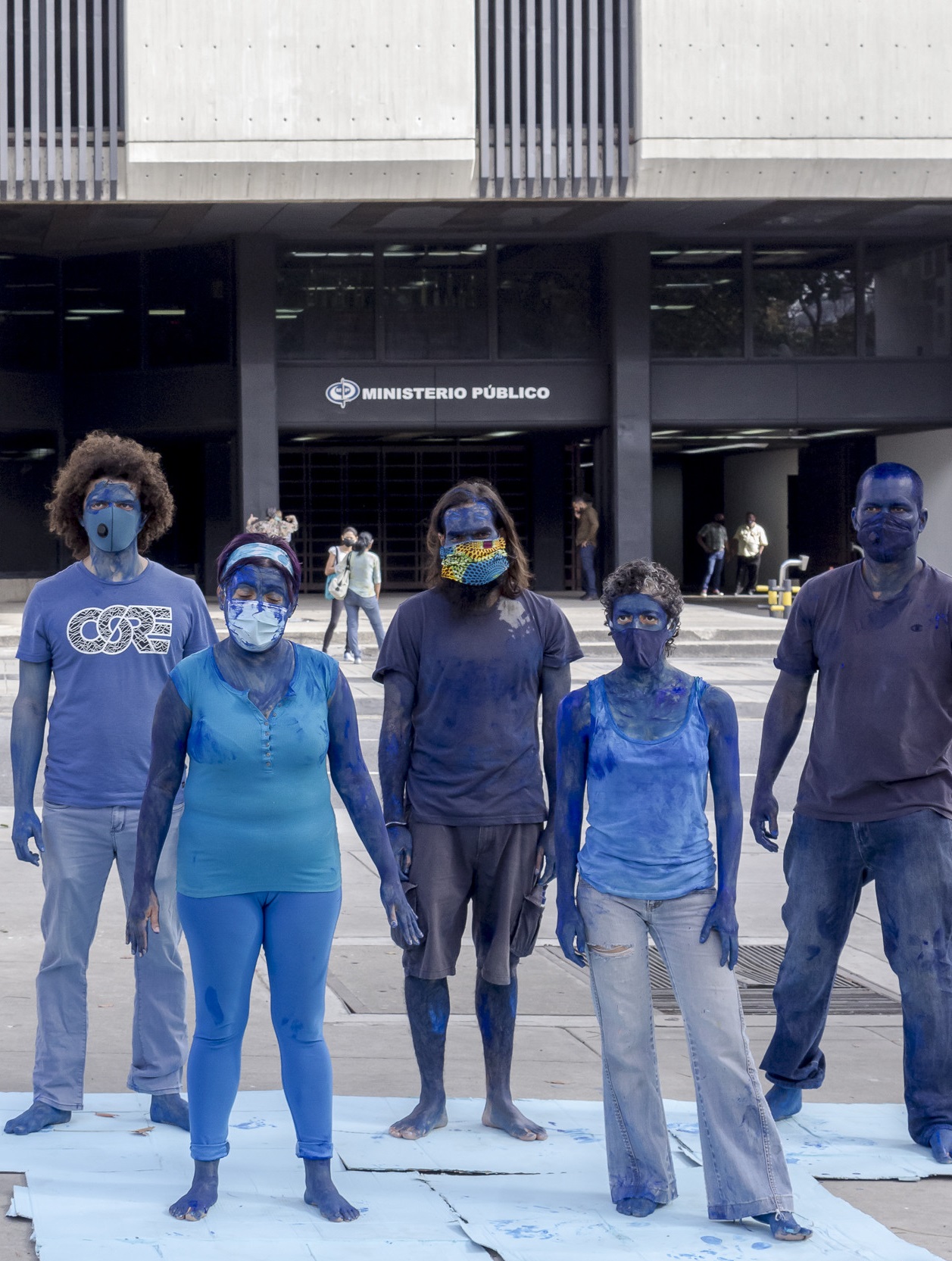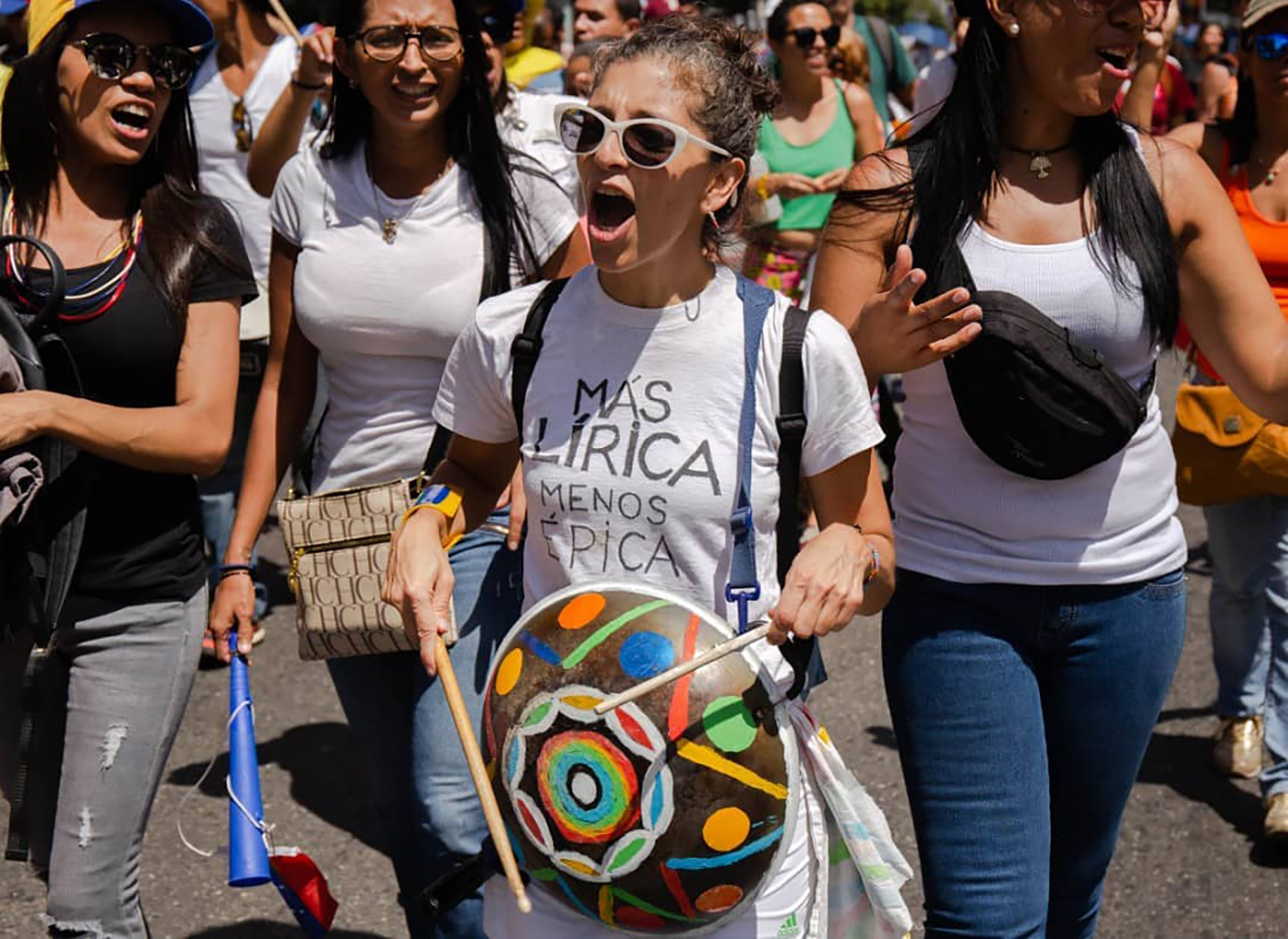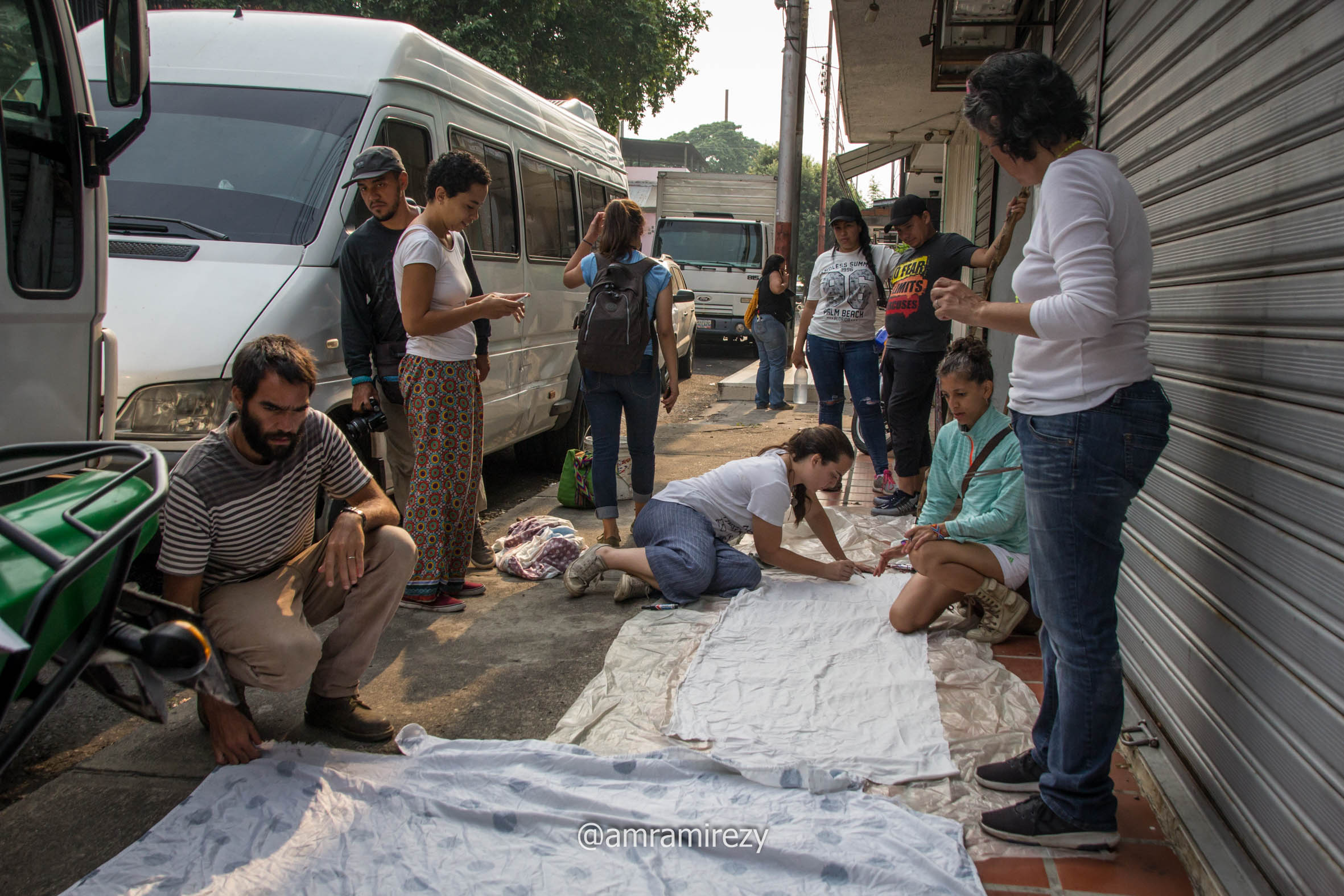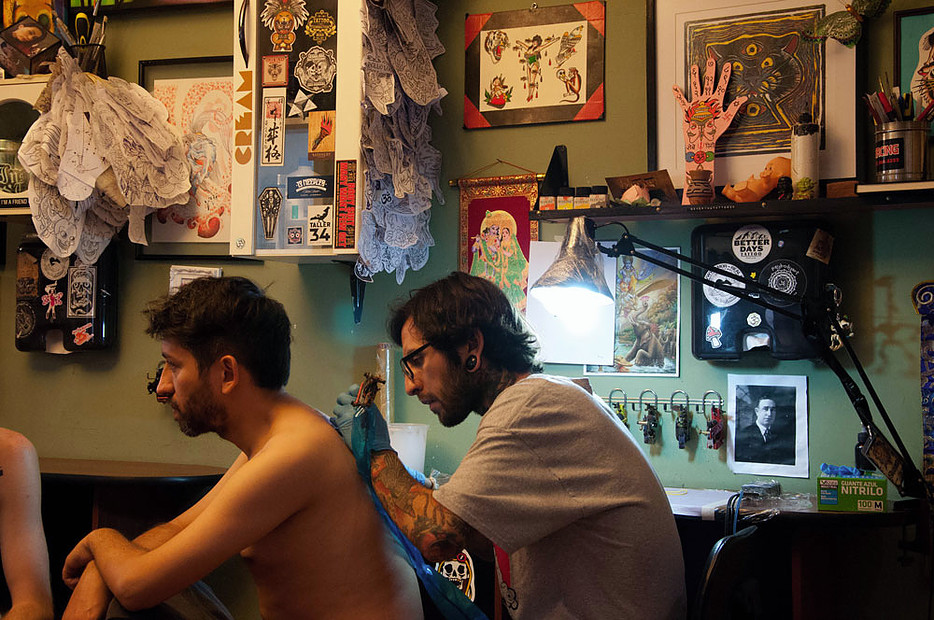A Playground against Oppression
Led by Eduardo Burger, Gracia Salazar lang, Seymar Liscano, Andreina González, and Rogmy Armas, Labo Ciudadano (Caracas, Venezuela, 2017) is a laboratory of social innovation that co-designs experiences of non-violent collective action. In response to the desire for a different reality, their work is a continuous exercise of experimentation and action where, from the encounter around listening and reflection, they seek cultural agitation to exercise solidarity, to create bonds of trust and affection that enliven the social fabric in the context of oppression and violence of the Complex Humanitarian Emergency they inhabit.

Education
Setup
We were born from the protest in the streets of Caracas and Venezuela in May 2017. We are a group of diverse citizens who met on the asphalt during that long cycle of protests. At that time we were a space for action and reflection around nonviolent protest: a citizen meeting space to learn about nonviolence and generate tactics that would allow citizens to raise their voices for their rights in a creative, innovative and safe way for those who were demonstrating.
It all started with a couple of meetings at the beloved Lugar Común bookstore, now non-existent, which hosted our workshops on nonviolent protest organized by Cheo Carvajal and Jaime Cruz with María Teresa Urreiztieta as a guest. We gathered a lot of people looking for an alternative to the protests that were becoming increasingly violent due to government and police repression. We sought to inhabit the streets of protest as subjects, not as objects instrumentalized by political parties and beyond the idea of throwing molotovs and risking death.
We began meeting every Thursday to think about non-violent protest tactics. Groups like Las Piloneras and Dale Letra came together, followed by others like El BusTV. The ideas of some came together with the comments of others, and new proposals and new groups emerged. There was a lot of encouragement and hope for change.
Once repression and the establishment of the National Constituent Assembly cooled the streets to end the first cycle of protests, a group of us used the pause to think about nonviolent protest from a strategic dimension in order to activate it in other ways. This is how the Citizen Laboratory of Nonviolent Protest emerged, later named Citizen Laboratory of Active Nonviolence or Labo Ciudadano [Citizen Lab].
Teaching
Following our experiences, we recognized that the most important result of the exercise of nonviolence is its effects on the social fabric: the transformed, depolarized, defragmented social relations. Although at the beginning the main thing was the protest, the tactic, all this occurred under the logic of encounter and experimentation. That is why we started to have conversations aimed at getting to know people from neighborhood organizations and people from the human rights movement (a vast world that we did not know).
Thus we gradually expanded these relationships in the social ecosystem until we became, through these dialogues, what we are today: a social innovation laboratory that co-designs collective action experiences. That is, we organize meeting spaces, cultural actions, workshops, mobilizations, and conversations that revolve around human rights and non-hegemonic politics.
Our goal is to connect and agitate diverse people in order to occupy civic space under alternative ways. In the face of structural violence and social fragmentation, we insist on cultural agitation to exercise solidarity, to create bonds of trust and affection that enliven the social fabric in a context of oppression.
As a Laboratory, our educational practices are centered on experimentation: we try out an idea in a savory process where mistakes are welcome and sometimes even desired. We learn from it and innovate in the next experiment, forming body and tools.
For example, at Labo we have a device called ‘La Perolera,’ a batucada formed by musical instruments made from waste materials, with which we accompanied street demonstrations with chants and to which anyone could join. It was in the street that we understood the impact of La Perolera: the possibilities that music and enjoyment offer for non-violent protest, how they can change the energies and moods of a collective demonstration and serve as a channel to raise voices from the rebellious joy.
When we conceive education from experimentation, the possibilities open up: it can be an artistic practice in itself, it can be playful, and it can be a party or a protest. The keys and learning emerge from the process of reflection that is generated after each experiment, nurturing the next iterations or new experiments.
Of our devices, the one that has led us most to reflect on pedagogy and artistic practices is ‘El Parasistema’: a formative space that we organize together with PROVEA (Venezuelan Program of Education-Action in Human Rights for its acronym in Spanish). It is a cycle of practical workshops for the elaboration of creative artifacts that allow for catharsis and the channeling of discomfort through individual and collective dynamics of creative expression. As its name suggests, it is part of a strategy for another form of education, through alternative learning mechanisms that go beyond the traditional and structural forms of pedagogy.
In the first edition, we saw the potential of this device to catalyze exchange processes that connect territories, diasporas, artists, and activists. We widened the surface of contact, we connected with people who are active but perhaps not yet mobilized, we shared tools to trigger conversations, creative processes and other types of mobilization, and we advanced a quest that is a constant for us: for art to contaminate the spaces of activism, and vice versa.
Learning
We work within a framework of social innovation by practicing principles of agile methodology and people-centered design. That is: we use encounter, trial and error, listening, observation and experimentation to generate new processes and influence existing ones. Desire, celebration, pleasure, beauty, and the territory of the sensitive fuel us. We are nourished by the aesthetic searches and the referents of our members, as well as by the conversations we encourage. The bond nourishes us, basically. In this sense, we resonate with people and collectives coming from different paths.
We seek to be a mediating space, a meeting point, a playground where this diversity of people and collectives can meet, get to know each other and connect. We have learned that prior to the bonds of work and joint action, there are the bonds of trust and affection.
Although the formation of those who are part of the Labo come from the humanities, our differences are the strength that allow us to interpret realities, address problems and propose solutions from a variety of visions, looking for nuances and readings that arise from our different sensitivities.

Processes
Beginnings
Listening and resonance play an essential role in the emergence of new ideas, concerns, and tentative ideas. These arise from a need to mobilize, to raise one's voice linked to indignation or desire in relation to the need to change something, find solutions to problems or propose an alternative to an undesired situation. There is also intuition, a slow hunch that requires a lot of conversation and brainstorming in order for other ideas to emerge.
Questions
During a talk on poetry led by Yolanda Pantin with young poets, someone talked about trial and error as part of their creative process. Yolanda said she would not use the word ‘error,’ she preferred to talk about tantear1. We like to tantear and also to err: to follow intuition or listening towards a place that will never be definitive, without preconceptions of exactly how or when the place of arrival should be. Error allows us to recognize adjustments to be made in the next iteration. We also like to talk about drifts: transiting and being present without an established end.
Being a laboratory, the basis of our work is experimentation: we seek to reach unexpected places and connections, to lead to the opportunity to err. Therefore, doubt, error and intuition are a fundamental part of our processes.
Initially, such processes were thought of as open spaces, where we freely invited anyone who wanted to join us. Starting in October 2017, the core work phase began within Labo, where we put into practice the devices we were imagining. It is in that second cycle where what we call our corotos emerge: devices to generate action, fabric and content through a slightly more defined structure. Now we believe that we are in a third phase where, already having this structure, we begin to re-open ourselves to experiment again, to imagine new processes based on the meeting spaces and the bonds of trust that we have been and are generating.
Strategies
We collectively participate in spaces for reflection, conversation, imagination, and conception of ideas and devices. In such spaces, each person brings his or her singular vision, built from his or her individuality. This subjectivity is essential for the aforementioned processes as it allows us to interpret realities, address problems and propose solutions from a variety of visions, seeking nuances and readings that come from different sensibilities.
Our processes are divided into two main moments: divergence, in which all ideas are valid and all points of view nourish the process; and convergence, in which we seek to define, ground and concretize. This diagram, which we call our ‘innovation framework,’ outlines the different moments of our creative process. It all starts with la locha [laziness] through which an idea, a concern, or an initial discovery triggers our processes.
Procedures
We approach our problems and concerns from design thinking, with people as the center of the approach for the development phases of a project. Specifically, we use an agile methodology for the development of each project, working with scrums2 and sprints.3 Within this methodological framework, listening and observation are essential to develop any idea or project.


Dialogues
Sometimes they call us sometimes we call people. Above all, Labo is a meeting space where we like to start conversations, get together with people, listen and reflect in order to look at the B-side of things with confidence. Sometimes the ideas come from inside and then we call other people to work together, other times the concerns come from outside and they call us to laboratorize that concern.
Projects
In Progress
"Venezuela got fixed" says a phrase that troubles us while the overwhelming gentrification floods the country as luxurious makeup that seeks to cover the systematic violation of human rights at the same time that the state appropriates the language associated with those rights as part of its regime. In the face of this, it is time to explore and inquire among our battered duels and threatened pleasures in order to favor the circulation of desire.
We want to make our playground available to welcome restless people eager to invent more devices, laboratories, experimentation, and action roundtables. In the meantime, we continue cooking our parasystems and devices, we continue walking with others and co-designing interventions, responses, projects; experiments.
Let’s remember that one of the determining conditions of the Complex Humanitarian Emergency is that those who exercise power, either by action, omission or incapacity, generate a humanitarian crisis. In the Venezuelan case, the State is an empty structure that is unwilling and unable to meet the needs of the people. Therefore, it makes no sense to focus the action of activism solely and centrally on demanding the State to meet the needs of the citizenry, since the State will devote itself to meet these demands only to the extent that it suits its policy of precariousness, one that accustoms us to live without guarantees.
As far as possible, it seems to be necessary that actions, initiatives and concerns move towards the joint construction of citizen narratives and solutions to public challenges. As part of the systematic actions with which the State attacks people's dignity, elements associated with memory are violated in a double movement. On the one hand, citizens are polarized around the different practices and elements with which they tend to build their identity; while, on the other hand, the notion of a precarious memory is established, of a society that cannot offer itself guarantees over time. Thus, the social fabric is damaged by promoting affective disengagement, normalizing patterns of aggression and dividing society on the basis of what is or is not memorable, instead of promoting a space where shared memories can be exercised and explored—all this while neglecting basic needs. In other words, administering precariousness, both physically and psychologically, attacks the being.
In response to these learnings, we have redirected our work towards the laboratory phase, towards the development of experimentation and action roundtables. We want to pick up with more strength the use of the party and the rebellious joy, not for evasion but as a form of resistance, to trigger associations, that is to say, connections as a space for the exchange and strengthening of the autonomous citizen fabric, encouraged in a horizon beyond the threat, to build, to raise, to take the initiative. It is in this sense that for this year’s second semester we’re preparing a third edition of our device El Parasistema in which memory will be at the center of its reflections and experiments.

In Retrospect
When thinking about 2018 we distinguished two moments that meant an important lesson for us: a moment of many frustrations—that went hand in hand with the frustrations that we lived as citizens in general, of failed political promises but also of daily precariousness: that if there’s no water in the house, that if the car stopped working and there are no spare parts, that if the subway has failures again, that if there’s no Internet in the office, etc.—and a second moment around being patient with that frustration.
From the lessons learned we could highlight that the trust bond has to precede, necessarily, the work bond so that the joint action can be sustainable (and savory). With El Parasistema we proved that the sensitive is a terrain where we can meet in the difference and deepen in complex issues, something difficult from activism given its frontality. We think of El Parasistema as a meeting and training strategy, an ideal device to explore resilience in an innovative, different and disruptive way. It is also a prototype of virtual connection that generates online-offline interactions that alternate according to the participants’ needs.
Context
Our practice develops in and from the social and political context we live day by day. In a context of oppression and massive and systematic violation of human rights, in which politics lies in shreds, we imagine other ways of doing politics. Faced with a State that has plunged us into total helplessness, we seek ways to protect each other. We do it in the public space, be it physical or virtual. It is there that we mobilize and seek to mobilize.
Years ago, a Labo friend and referent introduced us to an image that answers this question: the submarine. We have to be like a submarine, which at times stays in the depths (our strategic horizon, our theory of change) but every now and then returns to the surface (the situation) to observe, listen and reflect.

